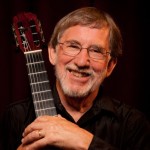A Conversation with Richard Provost
The following interview was conducted by Heather Lawless in 2014,
in advance of the premiere performance of Frank Wallace’s chamber suite As It Could Be. The work was commissioned by the Hartt School of Music’s Guitar Department for its 50th Anniversary.
 FROM THE PROFESSIONAL COMMUNITY
FROM THE PROFESSIONAL COMMUNITY
A Conversation with Richard Provost
by Heather Lawless
Fifty years after founding University of Hartford’s Hartt School of Music Guitar Department in 1964, Richard Provost leads his program in celebrating the milestone anniversary.
HL: What is the origin of the guitar program at Hartt?
RP: When I was a Hartt student I studied music theory because there was no guitar major. I began teaching here in 1960, and started the guitar bachelor’s program four years later. At the time, there was really only Segovia, Bream and Williams on the scene. When I presented my guitar proposal to Hartt their reactio n was, “These are musical geniuses! How will you develop a program that could compete with that?” Of course their biggest argument was that there was no repertoire for guitar. The first thing I did was put together three solo programs of all music written for guitar. I did include vihuela music, but no Bach transcriptions. Regarding Segovia I said, “Look at Isaac Stern. How many graduates of any program reach that level of stardom? I could use the same argument against teaching violin that you use against teaching guitar. Developing guitarists who can teach will raise the level of the instrument. That is how the violin became strong.” They loved that argument! Today we offer bachelor’s, master’s and doctoral degrees in guitar performance.
HL: Can you talk about the transformation of the American guitar scene triggered by college level guitar study?
RP: Now there are a large number of guitar graduates from University of Southern California, San Francisco Conservatory of Music, Florida State University, Peabody Conservatory, Eastman School of Music, The Juilliard School and The Hartt School, among many. These schools turn out excellent guitarists/musicians. And what do they all do? They teach. Even as recently as ten years ago, I’d be hard pressed to recommend a teacher for a high school student in New York City. The great teachers only taught college. Now, I could recommend half a dozen names. Incoming freshmen now perform at a high technical and musical level—we don’t have to spend the first two years developing their technique. Instead we make refinements, working on technique and interpretation skills simultaneously. We have freshmen playing as well as our graduating seniors did in 1968.
HL: How are you celebrating the 50th anniversary of the Hartt guitar program?
RP: Because we had a great turnout for our 40th anniversary and I plan to retire after next year, Chris Ladd and I decided to celebrate big for our 50th. Chris and I are both members of ensembles and asked composer Frank Wallace to write pieces for us. The conversation evolved into Hartt alumni and faculty performing a whole concert of Frank’s music. The commission of five works has now become eight. We are lucky to have support from a significant grant from Augustine Foundation. A couple of our alumni and La Bella Strings also gave sizable contributions to support Andrew York’s opening solo concert Friday night. On Saturday, faculty and alumni ensembles New England Guitar Quartet, The Phenix Ensemble, Alturas Duo, Kaleidos and Pandora Duo will premiere Frank Wallace’s new chamber suite, As It Could Be. At the end of that performance, about 50 alumni, students and community guitarists will perform York’s Attic.
HL: What were your considerations when commissioning these works?
RP: Frank writes modern sounding music that has a broad appeal. Some composers’ works are fun for the performer to play, but don’t give the audience the same satisfaction. We could have said, “Oh, we should contact John Adams or Steve Reich,” but it was important that the pieces be accessible to guitarists as well as the audience. The results are eight pieces written for a variety of ensembles and soloists and that have expanded the solo and ensemble repertoire for guitar. Often non-guitarists write great pieces that don’t use the guitar very well. The advantage of commissioning a composer who plays guitar is that we know the pieces will work musically and technically for guitar. Plus, we simply like Frank’s music! The works that he composed have far exceeded our most optimistic expectations. I have heard nothing but raves from the players who will be performing them.
Recent Comments